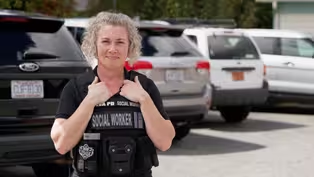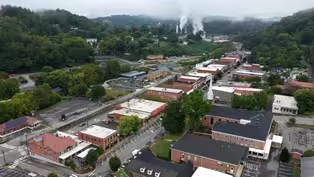
Fixing the Emergency Call Staffing Shortage
Clip: 2/21/2025 | 5m 54sVideo has Closed Captions
911 centers face a critical dispatcher shortage as cities rush to staff emergency lines.
This video investigates the growing shortage of 911 dispatchers. From burnout to budget constraints, we reveal why call centers struggle to maintain these vital positions. Learn how cities in North Carolina are fighting back with innovative solutions, from increased pay to mental health support, ensuring someone always answers when seconds count.
Problems playing video? | Closed Captioning Feedback
Problems playing video? | Closed Captioning Feedback
ncIMPACT is a local public television program presented by PBS NC

Fixing the Emergency Call Staffing Shortage
Clip: 2/21/2025 | 5m 54sVideo has Closed Captions
This video investigates the growing shortage of 911 dispatchers. From burnout to budget constraints, we reveal why call centers struggle to maintain these vital positions. Learn how cities in North Carolina are fighting back with innovative solutions, from increased pay to mental health support, ensuring someone always answers when seconds count.
Problems playing video? | Closed Captioning Feedback
How to Watch ncIMPACT
ncIMPACT is available to stream on pbs.org and the free PBS App, available on iPhone, Apple TV, Android TV, Android smartphones, Amazon Fire TV, Amazon Fire Tablet, Roku, Samsung Smart TV, and Vizio.
Providing Support for PBS.org
Learn Moreabout PBS online sponsorship- Imagine calling 911 in your most desperate moment only to be met by silence.
Across North Carolina and the nation, this nightmare scenario is becoming increasingly possible as 911 call centers face a critical staffing shortage.
Dispatchers are overworked and under immense pressure, they're leaving the profession at alarming rates.
And the shortage means longer wait times for callers in emergencies, where every second can be the difference between life and death.
[siren blaring] But how did we get here?
And what's being done about it?
In the next few minutes, I'll try to find those answers.
911, what is the address of your emergency?
And then put myself in a dispatcher seat to see if I can field a simulated 911 call.
I'm David Hurst.
This is "ncIMPACT."
[upbeat music] [people chattering] Inside the Richmond County 911 dispatch center, rows of computer screens glow with incoming calls.
This is where life-and-death decisions happen every day.
Garrett McInnis is an assistant shift supervisor here.
With only 21 dispatchers instead of the required 24, they're what he calls slightly short-staffed.
- It takes a toll on everybody here.
I mean, you have to pick up more shifts, you're working longer, you seem like you spend more time here than you do at home.
[chuckles] - [David] And those working conditions has meant the county has lost dispatchers.
But this challenge goes far beyond Richmond County.
Across America, one in four 911 dispatch positions sit empty.
The mix of high-stress work and low wages while remote work options were exploding during the pandemic created a significant workforce shortage by 2021.
Then it got worse.
The exodus of workers resulted in increased overtime for the remaining staff, and this just created a cycle of overwork and burnout.
- Most of the time when you pick up a phone call, you're talking to somebody on their worst day.
And so having those conversations on a frequent basis can be difficult and it's not made for everybody.
- [David] So in Richmond County, their solution to fix this goes beyond recruitment.
Their innovative training program aims to better prepare and retain dispatchers for the demanding reality of the job.
Richmond Community College has created the first comprehensive degree program specifically for 911 telecommunications.
The program covers everything from crisis management to the psychology of emergency response.
Students learn through advanced simulation technology, hands-on training, and real-world experience in actual 911 centers.
But what might make this program unique is its reach.
Through partnerships with other community colleges, they're taking it statewide.
- You've got to invest in those folks because they're the difference between, in many cases, life and death.
- So how do you train someone to handle life-or-death situations in a classroom?
I wanted to find out firsthand, so I sat down to try their dispatch simulation software.
911, what is the address of your emergency?
Samantha Peaks, Richmond County's 911 training coordinator, helped me through the call.
What is the phone number you're calling from?
On the other end of the line is an AI-generated caller whose neighbor had fallen off a ladder.
Is someone helping him?
During the four-minute call, I got the necessary information from the caller and routed paramedics to the scene.
All right.
I think we did pretty good.
[both laughing] Samantha's laugh wasn't very reassuring, so I checked my results.
Oh, so I got a D, [chuckles] 61%.
Not too bad for my first try.
- [Samantha] So, with no training, I think you did great.
- [David] All right, I'll take it.
- [Samantha] [laughs] I think you did great.
- [David] So probably a few sessions with you and I'll be good to go, right?
- Yeah, absolutely.
[David chuckles] Come on.
[laughs] - [David] But as my D-grade performance showed, training is just the first hurdle.
[pensive music] Retention of trained dispatchers remains a significant issue in the industry.
Data from several emergency call centers indicate high turnover rates, with some reporting that up to half of new hires leave within their first year.
Industry experts cite several factors for this, including job stress, shift work, and compensation levels.
So how are emergency call centers trying to plug this leak of talent?
In Richmond County, they're focusing on the human element.
From peer support programs to responder assistance initiatives, they're creating a network that helps dispatchers manage the emotional toll of the job.
But across the country, agencies are also turning to technology to ease the burden on their teams.
For example, some agencies are turning to artificial intelligence to streamline calls.
The software automatically transcribes calls and can route non-emergencies while elevating serious incidents like burglaries or shootings directly to human dispatchers.
Other centers are allowing their telecommunicators to work directly from home and answer calls remotely.
But while agencies experiment with AI and remote work to ease the burden on dispatchers, there's a more fundamental problem that's holding them back.
911 dispatchers are officially classified as clerical workers, similar to receptionists and customer service representatives.
This classification means lower pay, fewer benefits, and less recognition for the critical work that literally saves lives.
- No one recognize the unsung heroes that are behind the scenes.
The most important person you're gonna talk to is the one you never see.
- [David] But this could change.
The Enhancing First Response Act is before Congress.
It would reclassify dispatchers as protective service occupations, officially recognizing them as first responders.
Reclassification could help dispatchers get better benefits and higher wages.
- This isn't just a typical desk job, and that's where we're starting to grow the public's understanding of that.
- [David] Even as staffing shortages strain the system, Garrett McInnis finds optimism in these new approaches and hasn't lost sight of why he chose this career in the first place.
- I mean, it has its dark days, but I think if you can, if you can take every little win that you get, the bigger picture is the fact that you get to help people.
[dispatchers chattering and laughing] - [David] For "ncIMPACT," I'm David Hurst.
How Alternative Policing in Rural America Could Work
Video has Closed Captions
Clip: 2/21/2025 | 8m 16s | Small towns reshape their crisis response. Are social workers the future of public safety? (8m 16s)
Video has Closed Captions
Preview: 2/21/2025 | 20s | As public safety needs evolve, communities pioneer creative solutions to protect their residents. (20s)
Rural Communities Are Rethinking Women's Incarceration
Video has Closed Captions
Clip: 2/21/2025 | 8m 25s | Rural communities are adapting as more women return home from prison. (8m 25s)
Providing Support for PBS.org
Learn Moreabout PBS online sponsorship
- News and Public Affairs

Top journalists deliver compelling original analysis of the hour's headlines.

- News and Public Affairs

FRONTLINE is investigative journalism that questions, explains and changes our world.












Support for PBS provided by:
ncIMPACT is a local public television program presented by PBS NC


